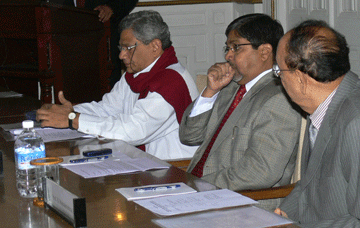 People's Democracy
People's Democracy
(Weekly
Organ of the Communist Party of India (Marxist)
No. 39
September 30, 2007
(Weekly
Organ of the Communist Party of India (Marxist)
|
Vol.
XXXI
No. 39 September 30, 2007 |
Communalism Is A Regression From Democracy
Tikender Singh Panwar

Yechury and Mungekar on the dais
A NATIONAL workshop on ‘National integration and multiple identities -- Dialectics of Inclusiveness and Exclusion’ jointly organised by the Indian Council of Philosophical Research (ICPR) and the Indian Institute of Advanced Study (IIAS) was held on September 14-16, 2007 at the sprawling campus of the IIAS in Shimla, which was an erstwhile residence of the Governor General of India during the British rule.
The seminar was inaugurated by Sitaram Yechury, Polit Bureau member of the CPI(M). Ten papers were presented in the seminar by leading luminaries of the country. Professor Bhalachandra Mungekar, chairman of the IIAS, Professor K Ramarishana Rao chairman ICPR, New Delhi, Professor S K Thorat, chairman UGC and Dr Ashgar Ali Engineer participated in the seminar. Dr Ashgar Ali Engineer presented a paper on 'Identity and Social Exclusion-Inclusion: A Muslim Perspective'. K Padmanabhaiah, former union home secretary and currently Indian government’s representative for the Naga peace talks was another discussant. Professor Rajender Prasad from IIT Kanpur presented a paper on 'Ambedkar Diagnosis of National Excluvisim and his remedy for ensuring National Inclusivism'. Professor K S Chalam, member, Union Public Service Commission presented a paper on 'Post Ambedkar Scheduled Castes Agitations and Social Exclusion in Andhra Pradesh'.
Sitaram Yechury, while inaugurating the seminar reminded the audience that it is this place, the IIAS, where the first ever reforms in the education sector were drawn out in 1902 by Lord Macaulay and said that many historic developments had taken place inside its premises. Speaking on the subject, Yechury stressed the need to differentiate between philosophy and theology and said, these days there is a trend to intermix both, as also mythology and history which needs to be combated. He said ours is a country with immense diversity and to tackle the problems of the evolution of the future of the country, it is philosophy that has to take a correct approach. Giving his own example, he said he was born in Chennai, but hails from Andhra, brought up in Delhi and married to a Muslim, and his children have multiple identities. “This kind of multiplicity is there and needs to be acknowledged. There should not be enforced identity. This is a challenge we have to face, but this can be done only through consistency, equality, and not to enforce upon one’s identity but to reach a confluence. And in this, communalism is one of the biggest hurdles. It is a regression to democracy. Communalism seeks to impose uniformity and, here is the historic task of the ICPR to separate theology from philosophy and mythology from history and to seek truth from facts,” he said. The second aspect on which he spoke was on not merely giving a recognition to the fact of inequality but also granting the opportunity of equality to all. Without recognising the equality before law, the modern definition would just remain in papers and there can be no national integration, he said.
Yechury noted that there is both a positive and a negative element to the present caste mobilisations taking place. Asking the intellectuals to search for a new way of building on the fractured reality, he felt a multilayered approach should be adopted.
Professor B Mungekar, chairman of the IIAS in his address made a scathing attack on communalism. He said, if fascism comes, it shall come through the communal politics. Bringing to fore the differences between Ambedkar and Gandhi, he said, Ambedkar had rightly stressed for the annihilation of caste and not its perpetuation.
Professor Rao said the task of the philosophers is not just to speculate, but to raise issues and to lead. Presenting his paper, he spoke on the challenges before the multiple identities in the country. He said he was concerned at the virulent divisiveness born of exploitation of identities for electoral gains. The trend of increasing political polarisation in terms of language, religion, region and caste seems to undermine the emphasis of the secular spirit of India, undermine national integration and unsettle one’s confidence in the bonding of Indian spirit, he said.
Intervening on the paper, Yechury noted that there should be a method of defining nationality and in this context he said the Marxist definition is the correct one. And in this the psychological make up of the community or an individual should also be kept in mind, he said. Regarding the multiple identity, Yechury said that this should be considered as a dynamic concept.
Abid Hussein, former ambassador to the US and former union commerce secretary, government of India, made a valuable contribution to the discussion by asking the chairman Professor Rao to go through the discussions of the Constituent Assembly, where three different views of shaping the country had come up.
The vote of thanks was delivered by Madhukar Sinha, secretary of the IIAS, Shimla.